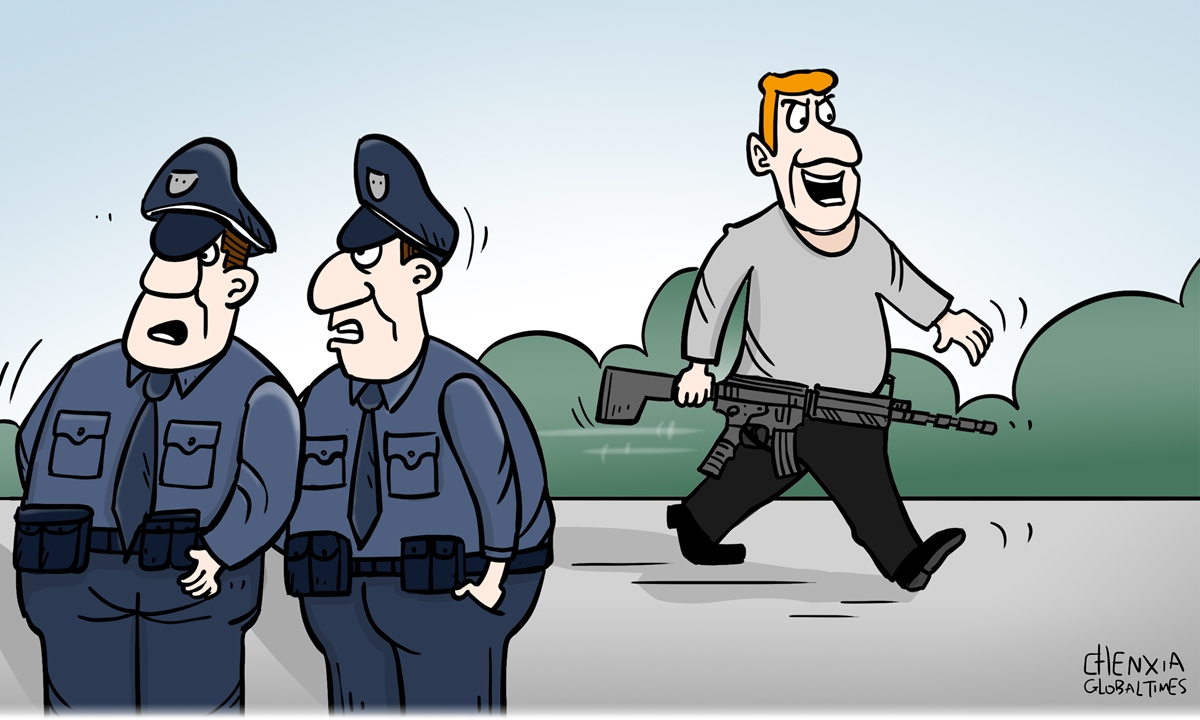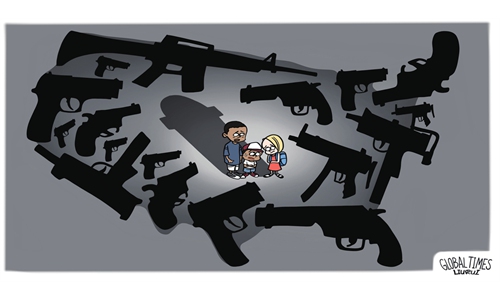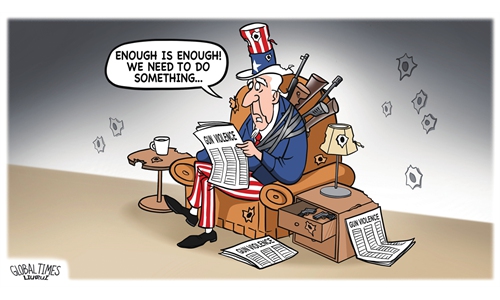
Illustration: Chen Xia/GT
Over the Easter holiday weekend in the US, there were at least 10 mass shootings across the country that left eight people dead and dozens injured. This adds to an estimated 144 total mass shootings that have taken place this year alone, according to data from Gun Violence Archive.As the only country on the planet with this problem, it begs the question of how and why this problem persists. While there have certainly been countless reports on the root causes of gun violence, one easily identifiable denominator is the failure of US policy.
For example, we saw this clearly in an attack last week on a Brooklyn subway train that injured nearly 30 people, including 10 who were shot. In this instance, a man put on a gas mask, threw down smoke grenades and began firing into a crowd. Suspect Frank James was arrested after a 30-hour manhunt ended with him being spotted by a good Samaritan.
What's interesting about this incident is that it happened in New York City, the country's most populous city with the most well-funded police force in the world.
In 2021, the New York City Police Department had a budget of $9.9 billion, which is significant, for example, when compared to Ukraine's entire national military budget of about $6 billion. All told, the NYPD has about 36,000 active officers and 19,000 civilian employees, making it essentially a small military.
The fact that an active shooter could bring weapons into the subway system, injure dozens of people and be on the run for more than a day raises serious questions about the effectiveness of this armed-to-the-teeth police force.
So far, we know that even the surveillance cameras on-site didn't work and that police were stitching together an investigation based on cell phone videos. The suspect was found randomly on the side of the street by a good Samaritan. And reports say the suspect even called the tip line on himself that led to his arrest.
Meanwhile, last month the NYPD arrested 143 people in the city's subways and removed 455 people from trains and stations during a one-week crackdown on crime and homeless people. Newly elected Mayor Eric Adams, a tough-on-crime Democrat, promised to launch an aggressive effort to make the subways safer. This apparently means arresting people without tickets in the subway and outlawing homelessness while mass shootings are left unaccounted for.
It's hard not to see this juxtaposition and come to the conclusion that the NYPD's budget is going toward terrorizing the poor instead of actually keeping people safe.
Of course, we can always see a similar story play out in the continual instances of police brutality that happen all over the country as well as America's love for mass incarceration. On police brutality, US police forces are noted for their exceptional brutality against minorities. This was the impetus behind the 2020 George Floyd protests, spurred after the extrajudicial killing of George Floyd, an unarmed black man, by Minnesota police officers.
On mass incarceration, there is perhaps no better demonstration of how mass incarceration doesn't work than the fact that if it were true that more people in jail meant more safety then America would be the safest country in the world. This is because the US has the largest prison population in the world. The fact that mass shootings are such a daily occurrence despite the country's go-to tactic of jailing offenders, disproportionately black people and people of lower-income, immediately dispels this notion.
Yet even despite how ineffectual police are generally and how wasteful budgets are, there are, particularly in the wake of the Brooklyn shooting, calls to fund the police even more. Advocates say that if only the police had more resources and sometimes even less accountability then they'd be able to stop any bad guy out there.
The facts simply do not support this position. US police, especially the NYPD, are extraordinarily well-funded and have little accountability - far less than police departments of most other countries - and are blatantly inept, ineffectual and, more often than not, a blight on the communities they "serve" in. Rising crime demonstrates that resources need to be put elsewhere - into things like public housing, universal health care and universal education.
The author is a Prague-based American journalist, columnist and political commentator. opinion@globaltimes.com.cn



